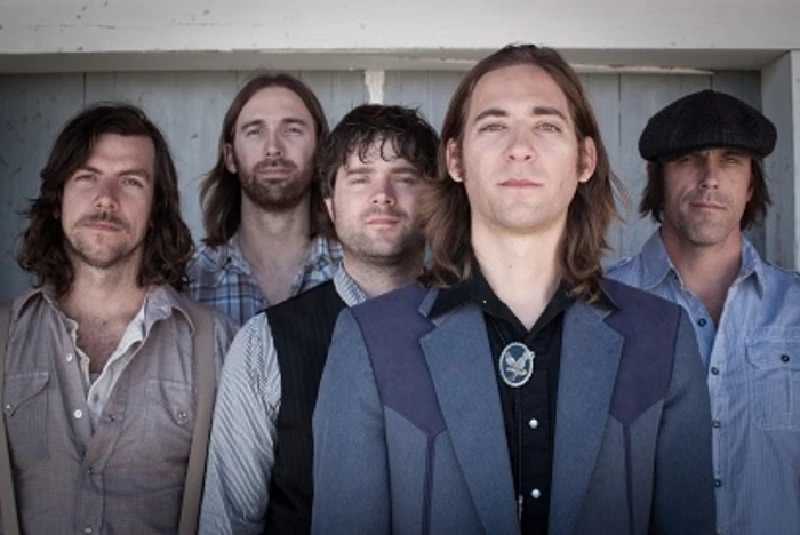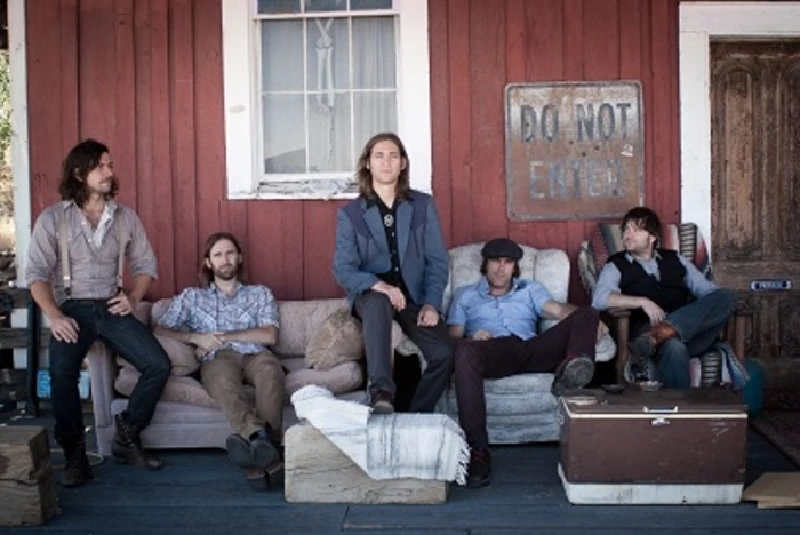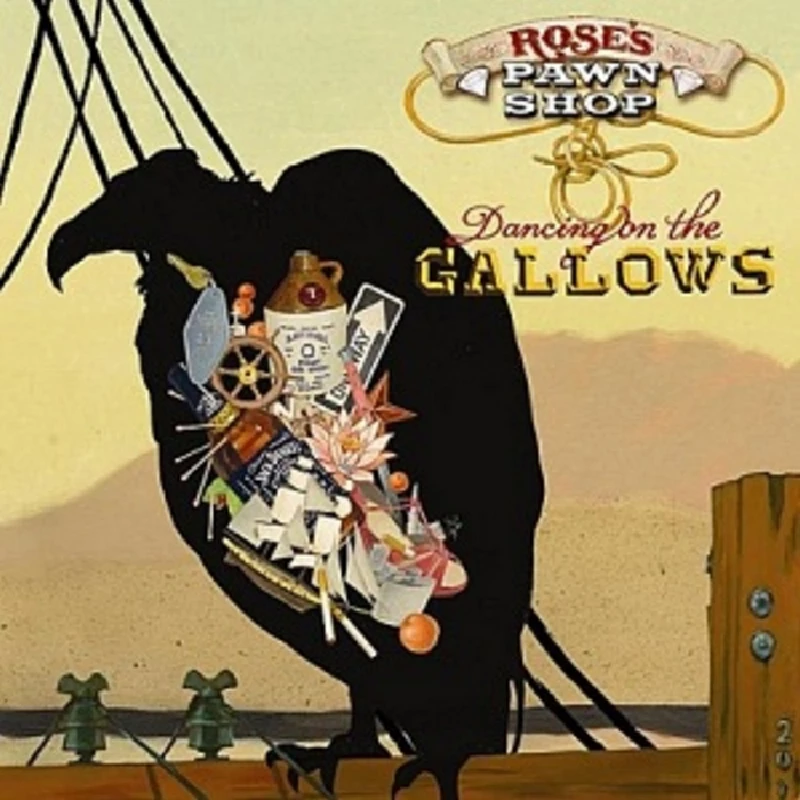Rose's Pawn Shop - Interview
by Benjamin Howarth
published: 24 / 3 / 2013

intro
Ben Howarth chats to American folk/country group Rose's Pawn Shop who have just completed their first British tour at a gig in London about their latest album, ‘Dancing on the Gallows’, which was recorded with Gaslight Anthem producer Ted Hutt
Despite having released their first album in 2006, it has taken Rose’s Pawn Shop until 2013 to visit the UK for the first time. This five piece band play a rocked-up version of bluegrass – turning singer and songwriter Paul Givant’s often dark lyrics into uptempo dance music. They are a band who perform with a smile on their face, but – as they explained in this interview – they hope that a third album will be the one that establishes them not just as a good live act, but also as respected recording artists. I meet the band just before they are due to go onstage at a launch event at the Gibson Guitar Studios in Soho for the Maverick Festival (a blues and country festival, held each year in Suffolk. Aside from Paul, the band are Tim Weed (fiddle, mandolin and vocals), John Kraus (banjo, mandolin, electric guitar and vocals), Stephen Andrews (upright bass) and Christian Hogan (drums). What started out as a polite chat about their first trip to the UK – earlier that day they had taken photographs on the famous Abbey Road zebra crossing – turned into a fascinating discussion of the difference a good producer makes to a band, and their desire – after eight years together – to take their own music a little more seriously. PB: How long have you been in the UK? PG: Well, we got here at the end of February so it has been about two and a half weeks in all, but we were in Ireland for some of that. We spent a week in Ireland. PB: How has it been going? PG: It’s been great. We have had a handful of sold out shows, which we really weren’t expecting, as it is our first time over here – including last night in London. So we’re really pleased with that. It feels like the audiences were receptive and we are feeling good about the trip. PB: You played at tThe Green Note in Camden last night? I’ve been there a few times – a nice little venue. PG: Yeah, not such a hard room to sell out! It’s not the biggest, but still… TW: They were enthusiastic. It was a good show. PB: Have there been any places you have particularly enjoyed playing? JK: Cork. That was fantastic. TW: Also Stranraer. We really liked Scotland. PG: We also had a good show in Edinburgh, and our first show at The Old Duke in Bristol was great – a really good kick off show for the tour. JK: It’s right over the road from this strange, really old pub. It’s this leaning over building, where all the writers would meet. PB: So what had taken you so long to come to Britain? PG: Good question! I don’t really know… I guess it was maybe that we didn’t think it was something we could do until recently. This has kind of been a leap of faith. It’s a big investment. Luckily this tour has gone well and it has really worked out, but we didn’t know if that was going to be the case. SA: And if we had tried to come over here on our own and tried to book shows that would have been a catastrophe. We were lucky to hook up with a great booking agent and that was one of the main reasons for coming over. PG: We had mutual friends that had worked with him in the past – a band called the Water Tower Bucket Boys – and they recommended him to us and made the introduction. PB: Does it feel like you have been playing to people who know your music or has it been new crowds that you have had to win over? PG: The majority I would say are new people, but there have been a handful of shows where I’ve seen people singing along to the lyrics… JK: …And in Cork they were pretending to know the lyrics. TW: That has actually happened in a few places, where people feel they have to sing along… whether they know the songs or not. PG: That was actually a couple of American girls doing that. I think they were singing along to songs by bands that they wanted us to play… they kept asking us to do Lumineers’ songs. PB: So the album you’ve been selling on this tour, ‘Dancing on the Gallows’, is quite an old record… PG: Yeah, it came out in 2010. We have actually just finished off a new record. We just finished recording that the day before we left to come over here. I’m sure the next time we are back we will have that along with us. Right now, it is still being mixed by our producer, and then there will be a period of talking to labels. JK: We haven’t even heard it ourselves, that is how new it is. We literally wrapped up the recording at breakneck pace and then got in an airplane. PB: How long were you in the studio for? PG: We did about three weeks of pre-production, and then we were in the studio for two weeks. Without the pre-production, it would have been a nightmare, but we went in there fairly sure of what we were going to do. SA: Basically everything had been on hold for the last month and a half, just to get this album completely done and recorded. PG: We’re excited about it, but we’re curious about it at the same time. Our producer is back there working on it as I speak, but we’ve not heard it. But I think the songs are really great. It’s going to be a strong record. PB: Who produced it? PG: Ted Hutt. He’s produced bands like Old Crow Medicine Show, the Gaslight Anthem, the Dropkick Murphys, Flogging Molly – he was also a founding member of Flogging Molly, and then went into producing. He’s actually English, though he has been based in America for many years. PB: Is the new album going to be much of a change to what you have done before? PG: It is on the same lines, but I would say that this album is the most focused of all our records. Previous records had a lot of twists and turns in musical styles. That was kind of our original idea when we started – we wanted to be a smorgasbord of different styles. But this record, while it is still Americana-folk-rock, it has more of a through-line among the songs. There are a lot of upbeat songs, but – whereas old songs have tended to be either fast or slow – this album has a lot of mid-tempo tracks, in between the two extremes, which we haven’t done a lot of in the past. PB: Are they songs that you have played live a lot before you recorded them? PG: Two or three we have done live, but for the majority of the record, no we’ve not played it live. JK: We really came along with bare-bones ideas before we started working with Ted. And then in the three weeks of pre-production, we honed them so that when we recorded them, we knew exactly what we were doing. But we really didn’t have anything before those three weeks – we really weren’t sure what we were going to do at all before we started. PG: Actually, we had maybe more than twenty songs ready to show Ted, and the songs that we showed him were maybe a little more similar to what we were doing on the last record. He basically said “no” to lots of songs that we thought were going to make the record. He said that he wanted to make something that, like I said, had a through-line. So we ended up leaving off songs that were among our favourites that we had ever written in order to make the record more cohesive. But I think in the end that was the smart way to go. PB: Do you think those are songs that will come back – perhaps end up on album number four? PG: I think so. That was actually his reasoning to us – we were trying to fight him, and he said .“You can always record these later – just relax.” JK: That was how he tried to convince us not to press him any further to record those songs. And now, looking back he was a clever devil about that! PB: What about how the album sounds? How receptive were you to listening to his ideas, were you debating with him about the arrangement of the music? PG: Overall, his track record speaks for itself. He has been very successful. We wanted to believe in that and put our best foot forward in working with him. There were definitely times where, personally, I was not sure about his choices – especially leaving off certain songs – and I did a bit of pushing back, but in the end we went with his vision. SA: He had a good way of dealing with those situations. He wanted us to have our own mark – it wasn’t his show. He asked us what we thought. PB: How did that compare to the producers of your two previous albums? PG: Well, we produced the first album ourselves, though we had a friend in to help. For the second album, we went with Ethan Allen (producer of Throwing Muses and Sheryl Crow, among others – PB), and that was a good experience. But I think that Ted was a lot more engaged with the songs, and played more of a role guiding the record than we’d experienced in the past, and we liked it. Other producers would just say “do your thing, and I’ll record it”. TW: He was there through the pre-production process too, it wasn’t just the recording. PG: He was there for three weeks straight, working on the songs, every day. PB: Excuse my ignorance, but what happens in pre-production? Describe that process for me. JK: We came with our ideas for the songs, and we played them for him. For some, he just thought they were great and he didn’t touch them. But most of them, he advised on parts that should be longer, parts that should be shorter, suggested cutting out some of the solos and adding in extra sections elsewhere in the song. Then, he would suggest harmonies. Then it changed again when we started recording because he would get us to do multiple takes – we recorded songs in lots of different ways, and then he said that when we were in the UK, he would cut it up, mix it and pick the best takes. So that is what makes it really interesting – because even though we had something down when we left, we don’t know what version he is going to come up with, what he is going to show us. TW: It’s great to have someone outside of the process listening and making comments. Sometimes when you are in a band, you can almost become married to these ideas and it is great to have someone outside who gets you to think about those ideas a little more critically. PB: ‘Dancing on the Gallows’ sounds like a record that was written in a room, with people jamming together and then deciding that they would throw in a solo at certain points. PG: Yeah, there was a lot of playing! The process tended to be that I would write a basic song, and they would then shape it, add their parts. That was how parts of this new record worked, but it was more collaborative than in the past. We had some writing sessions that we did together, and then Ted came in and suggested peeling things back. There was a lot more thought to shaping the arrangements around the song, rather than trying to get all the cool licks on each song. On ‘Gallows’, I think what you hear is lots of cool, flashy stuff, which sounds awesome, but sometimes the song itself gets a little buried underneath it. PB: Was adopting a new way of working a reflection of not being happy with the last album, or just of a desire to try something new. PG: A little bit of both. SA: We were ready to mature as a band, move forward. JK: The landscape has changed around us as well. I think the last record was more of a Nashville style, very clean. I think we wanted to do something that would be a little more palatable for the kind of music that we are aiming for. This is a little more raw and a little more simple. TW: And, truly, I think it is more authentic then where we have come from on that last record. PB: Is that based on what you feel your natural affinity is – that you have perhaps been a band who make fun music which people like to dance to – but actually you would like the band to be taken a little more seriously, that you believe in the songs and would like perhaps a more serious response from the audience? PG: I think that is definitely kind of part of it. We’ve been a great, good-time party band for a while, and if you listen to the content of the songs that is not what they are really about, but that is how they have come-off. SA: We really enjoy being a good time party band! We do love it… PG: Oh yeah, we love it. But I think this time, it is a product of perhaps taking ourselves a little more seriously. PB: Is that also a product of the fact that the band has been around for a long time now? You’ve committed seven or so years to it… PG: I think so, and like Stephen said, you want to mature and move forward as a band. You don’t want to just keep rehashing what we had already done, and instead we wanted to do something new. Ted only helped bring that out even more, and helped focus it. At this point, we are interrupted by a drag act that – in a surprise turn that was a particular surprise to all of us who hadn’t been in the room at the time - has been conducting the assembled throng of Maverick festival promoters, journalists and PR types here to launch the 2013 event though an impromptu singalong, before Rose’s Pawn Stage come onstage. “You’ve changed your shoes since we met earlier,” John deadpans. Drummer Christian then arrives to tell his bandmates that they are expected on stage any minute – so I wrap up the interview. As they are getting ready to go onstage, Paul explains that the band’s ambition for the year is to keep working on the slow process of building an audience. He says that there are a number of music festivals where the band have been back every year, gradually getting a higher profile on the bill. They remain puzzled though by the fact that, while they have healthy following in certain parts of the US (Virginia, for example), there are areas in and around their hometown of Los Angeles where they struggle to draw anything like as large a crowd. He assures me that “we’re definitely going to come back to Britain!” But, exactly when will depend on when the new album is released.
Picture Gallery:-


most viewed articles
current edition
Carl Ewens - David Bowie 1964 to 1982 On Track: Every Album, Every SongArmory Show - Interview with Richard Jobson
John McKay - Interview
Colin Blunstone - Thalia Hall, Chicago, 16/7/2025
Billie Eilish - O2 Arena, London, 10/7/2025
Bathers - Photoscapes 1
Visor Fest - Valencia, Spain, 26/9/2025...27/9/2025
Loft - Interview
Sir Tim Rice - Interview
Robert Forster - Interview
previous editions
Manic Street Preachers - (Gig of a Lifetime) Millennium Stadium, Cardiff, December 1999Heavenly - P.U.N.K. Girl EP
Beautiful South - Ten Songs That Made Me Love...
Oasis - Oasis, Earl's Court, London, 1995
Peter Perrett - In Dreams Begin Responsibilities Interview Part One
Boomtown Rats - Ten Songs That Made Me Love....
Coldplay - Wembley Arena. London, 16/8/2022
Prolapse - Interview
Pixies - Ten Songs That Made Me Love...
Trudie Myerscough-Harris - Interview
most viewed reviews
current edition
Davey Woodward - Mumbo in the JumboSick Man of Europe - The Sick Man of Europe
Lucy Spraggan - Other Sides of the Moon
Amy Macdonald - Is This What You've Been Waiting For?
Phew, Erika Kobayashi,, Dieter Moebius - Radium Girls
Bush - I Beat Loneliness
Suzanne Vega - Flying With Angels
Alice Cooper - The Revenge of Alice Cooper
Cynthia Erivo - I Forgive You
Blueboy - 2
Pennyblackmusic Regular Contributors
Adrian Janes
Amanda J. Window
Andrew Twambley
Anthony Dhanendran
Benjamin Howarth
Cila Warncke
Daniel Cressey
Darren Aston
Dastardly
Dave Goodwin
Denzil Watson
Dominic B. Simpson
Eoghan Lyng
Fiona Hutchings
Harry Sherriff
Helen Tipping
Jamie Rowland
John Clarkson
Julie Cruickshank
Kimberly Bright
Lisa Torem
Maarten Schiethart